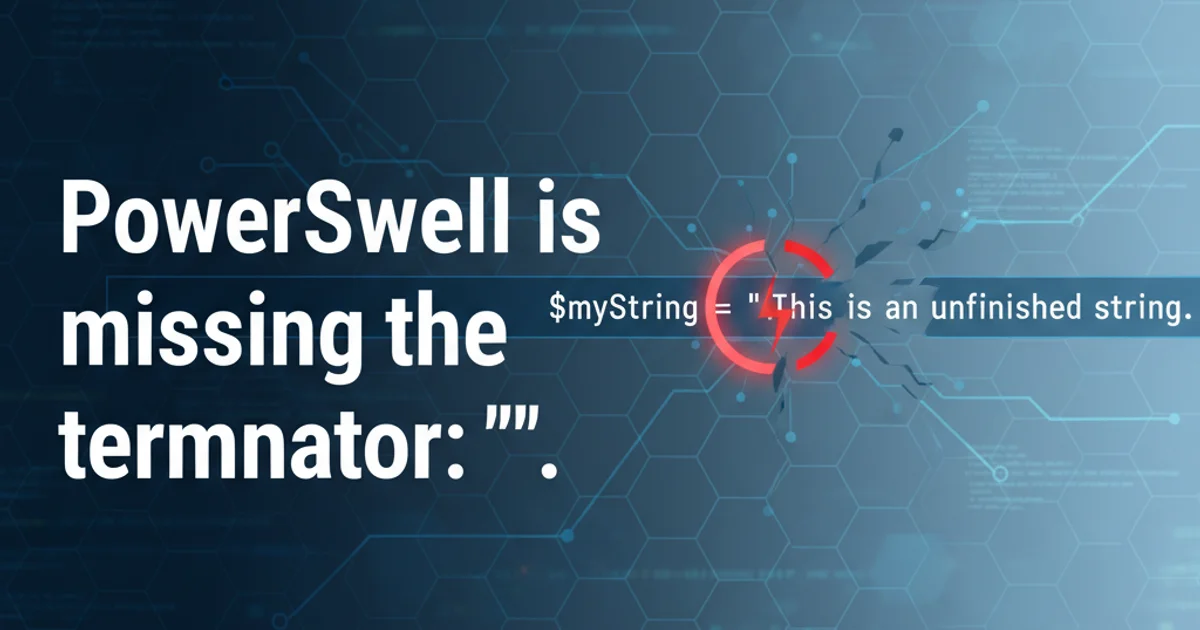PowerShell is missing the terminator: "
Categories:
Resolving the 'PowerShell is missing the terminator: "' Error

Understand and fix the common PowerShell error 'missing the terminator: "' which often arises from unclosed strings, special characters, or incorrect escaping in scripts.
The error message "PowerShell is missing the terminator: "" is a common frustration for users writing PowerShell scripts. This error typically indicates that PowerShell encountered an opening double-quote character (") but could not find its corresponding closing double-quote, leading to an incomplete string. This article will delve into the common causes of this error and provide practical solutions to help you debug and fix your scripts.
Understanding the Error: Missing String Terminator
In PowerShell, double-quotes (") are used to define expandable strings, meaning variables and expressions within them are evaluated. When PowerShell parses your script and finds an opening double-quote, it expects to find a matching closing double-quote to complete the string. If it doesn't, it throws the 'missing terminator' error because it doesn't know where the string ends. This can happen for several reasons, including simple typos, incorrect escaping of special characters, or issues with multi-line strings.
flowchart TD
A[Start Script Execution] --> B{PowerShell Parser Encounters `"`?}
B -- Yes --> C[Start String Literal]
C --> D{Find Matching `"`?}
D -- Yes --> E[End String Literal]
D -- No --> F["Missing the terminator: \""]
F --> G[Error & Stop Execution]
E --> H[Continue Script Execution]
B -- No --> HFlowchart illustrating how PowerShell handles string termination and the error condition.
Common Causes and Solutions
Identifying the exact cause of this error often involves carefully reviewing your script. Here are the most frequent culprits and how to address them:
1. Unclosed Double Quotes
The most straightforward cause is a simple typo where an opening double-quote is not matched by a closing one. This can happen in variable assignments, function arguments, or command parameters.
$myString = "Hello, World!
Write-Host $myString
Example of an unclosed string causing the error.
In the example above, the string assigned to $myString is missing its closing double-quote. PowerShell will read "Hello, World! and then expect the next " to close it. When it encounters Write-Host, it's still looking for the terminator.
2. Incorrect Escaping of Double Quotes within a String
If you need to include a double-quote character within a double-quoted string, you must escape it. In PowerShell, you escape a double-quote by preceding it with another double-quote (""). If you forget to escape it, PowerShell will interpret the internal double-quote as the end of your string.
$path = "C:\Program Files\My App\config.ini"
Write-Host "The path is "$path""
Incorrectly escaping a double-quote within a string.
In the Write-Host command, the first " opens the string. The " before $path is then interpreted as the closing quote, leaving the rest of the line ($path"") as unparsed text, leading to the error. The correct way to include a double-quote is to double it up:
$path = "C:\Program Files\My App\config.ini"
Write-Host "The path is ""$path"""
Correctly escaping double-quotes within a string.
3. Multi-line Strings and Here-Strings
When dealing with multi-line strings, especially those copied from other sources, it's easy to miss a closing quote or use an incorrect format. PowerShell offers "here-strings" for multi-line content, which start with @" and end with "@ on a new line, with no characters after the closing "@.
$multiLineText = @"
This is the first line.
This is the second line.
"@ # This comment causes an error
Incorrect here-string termination due to trailing characters.
The "@ terminator for a here-string must be on a line by itself, with no leading or trailing spaces or characters (like comments). The correct way is:
$multiLineText = @"
This is the first line.
This is the second line.
"@
Write-Host $multiLineText
Correctly formatted here-string.
4. Special Characters and Encoding Issues
Sometimes, non-standard double-quote characters (like smart quotes “ ” from word processors) or encoding issues can cause PowerShell to misinterpret a character as an opening quote without finding a matching closing one. Always use plain ASCII double-quotes (") in your scripts.
") into 'smart quotes' (“ ”), which PowerShell does not recognize as string terminators.Debugging Strategy
When faced with this error, follow these steps:
1. Examine the Error Message
PowerShell often provides a line number where the error was detected. Start your investigation there.
2. Check for Unclosed Quotes
Scan the problematic line and the lines immediately preceding it for any unclosed " characters.
3. Review Escaping
If you have " characters within a double-quoted string, ensure they are properly escaped as "".
4. Verify Here-String Syntax
For multi-line strings, confirm that @" and "@ are correctly placed on their own lines without extra characters.
5. Use a Plain Text Editor
If the issue persists, copy your script into a plain text editor (like Notepad++) or a code editor (like VS Code) to check for hidden or non-standard characters.
6. Simplify and Isolate
Comment out sections of your code to isolate the problematic line or block. This can help narrow down the search area significantly.